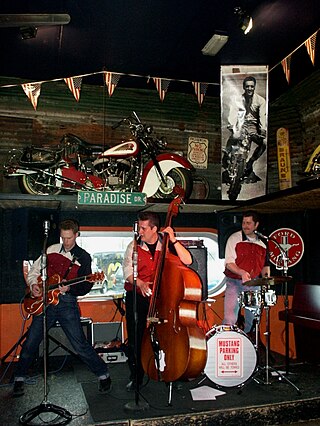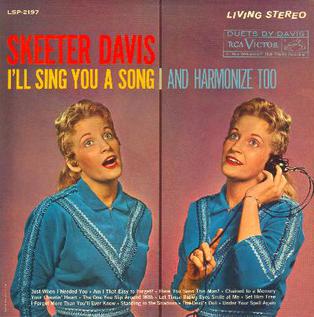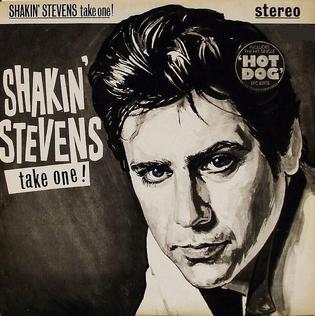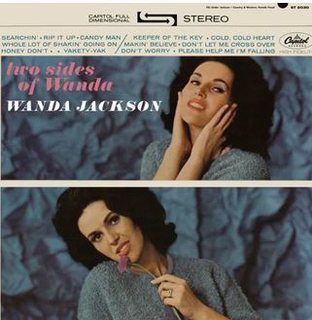
Rockabilly is one of the earliest styles of rock and roll music. It dates back to the early 1950s in the United States, especially the South. As a genre, it blends the sound of Western musical styles such as country with that of rhythm and blues, leading to what is considered "classic" rock and roll. Some have also described it as a blend of bluegrass with rock and roll. The term "rockabilly" itself is a portmanteau of "rock" and "hillbilly", the latter a reference to the country music that contributed strongly to the style. Other important influences on rockabilly include western swing, boogie-woogie, jump blues, and electric blues.

"Crazy Little Thing Called Love" is a song by the British rock band Queen. Written by Freddie Mercury in 1979, the track is included on their 1980 album The Game, and also appears on the band's compilation album Greatest Hits in 1981. The song peaked at number two in the UK Singles Chart in 1979 and became the group's first number-one single on the Billboard Hot 100 in the US in 1980, remaining there for four consecutive weeks. It topped the Australian ARIA Charts for seven weeks. It was the band's final single release of the 1970s.

Alvis Edgar "Buck" Owens Jr. was an American musician, singer, songwriter, and band leader. He was the lead singer for Buck Owens and the Buckaroos, which had 21 No. 1 hits on the Billboard country music chart. He pioneered what came to be called the Bakersfield sound, named in honor of Bakersfield, California, Owens's adopted home and the city from which he drew inspiration for what he preferred to call "American music".

"Summertime Blues" is a song co-written and recorded by American rock artist Eddie Cochran. It was written by Cochran and his manager Jerry Capehart. Originally a single B-side, it was released in August 1958 and peaked at number 8 on the Billboard Hot 100 on September 29, 1958, and number 18 on the UK Singles Chart. It has been covered by many artists, including being a number-one hit for country music artist Alan Jackson, and scoring notable hits in versions by Blue Cheer, the Who and Brian Setzer, the last of whom recorded his version for the 1987 film La Bamba, in which he portrayed Cochran.

Elvis Country is the thirteenth studio album by American singer and musician Elvis Presley, released on RCA Records in January 1971. Recorded at RCA Studio B in Nashville, it reached number 12 on the Billboard 200. It peaked at number six in the United Kingdom, selling over one million copies worldwide. It was certified Gold on December 1, 1977, by the Recording Industry Association of America.

Three Chords and the Truth is the debut studio album by American country music artist Sara Evans. The album's title comes from Harlan Howard, a country music songwriter to whom this quote is widely attributed. It also was an improvized lyric in U2's version of the Bob Dylan song "All Along the Watchtower," released on the Rattle and Hum album. The album was released in July 1997 via RCA Records Nashville and it produced three singles: "True Lies", the title track, and "Shame About That". Even though all three singles charted on the U.S. Billboard Hot Country Songs chart, none of them reached the Top 40, making this Evans' only major label album to not produce any Top 40 hits.

"Shakin' All Over" is a song originally performed by Johnny Kidd & the Pirates. It was written by leader Johnny Kidd, and his original recording reached No. 1 on the UK Singles Chart in August 1960. The song is sometimes credited to Frederick Albert Heath, which is Kidd's real name. Kidd's recording was not a hit outside Europe. In other parts of the world the song is better known by recordings from other artists.

"Devoted to You" is a song written by Felice and Boudleaux Bryant.

Doyle Floyd Hendricks, known by the stage name Doyle Holly, was an American musician best known as the bass guitar player of the country music band Buck Owens and the Buckaroos and for his solo hit songs "Queen Of The Silver Dollar" and "Lila". Holly's contributions on bass guitar and rhythm guitar were a key component of the Bakersfield sound. The Buckaroos had more than 30 Top 40 singles on the country music charts in the 1960s and early 1970s, with 21 number one hits such as "I've Got a Tiger By the Tail," "Love's Gonna Live Here,"and "Act Naturally." Their sound influenced later artists such as Creedence Clearwater Revival, Jackson Browne, The Eagles, The Derailers and the Desert Rose Band.
"Mona Lisa" is a popular song written by Ray Evans and Jay Livingston for the Paramount Pictures film Captain Carey, U.S.A. (1949), in which it was performed by Sergio de Karlo and a recurrent accordion motif. The title and lyrics refer to the renaissance portrait Mona Lisa painted by Leonardo da Vinci. The song won the Academy Award for Best Original Song in 1950.
The discography of Buck Owens, an American country music artist, consists of 39 studio albums, 16 compilation albums, 9 live albums, 97 singles, and 12 B-sides. After recording under the name Corky Jones and releasing a string of singles in the mid-1950s, Owens signed a recording contract with Capitol Records in February 1957.

Skin 'Em Up is the debut album from the Scottish neo-rockabilly group the Shakin' Pyramids, released in 1981 by Cuba Libre, a subsidiary of Virgin Records. It reached no. 48 on the UK Albums Chart, and yielded a single in "Tennessee Rock 'n' Roll". The band released three EPs during 1981, two of which were led by tracks from the album: Take a Trip and Tennessee Rock 'n' Roll. The album has been described as an important release in the early 1980s rockabilly revival.
"Turning Away" is a song written by Tim Krekel, and recorded by American country music artist Crystal Gayle. It was released in June 1984 as the third single from the album Cage the Songbird. The song was Gayle's fourteenth number one single on the country chart. The single went to number one for one week and spent a total of thirteen weeks on the country chart.

I'll Sing You a Song and Harmonize Too is the debut studio album by American country artist Skeeter Davis. The album was released in November 1959 by RCA Victor and was produced by Chet Atkins. It signified Davis' first solo album ever released after departing from the duo, The Davis Sisters.
A hot dog is a type of sausage, typically served in a hot dog bun.

The Bop Won't Stop is an album by Welsh rock and roll singer Shakin' Stevens, released in November 1983 by Epic Records. Compared to his previous albums, this album was not as successful, only peaking at number 21 on the UK Albums Chart despite the success of its singles.

Take One! is a 1980 album by British rock and roll singer Shakin' Stevens. It was his first release on Epic Records and his first album to enter the UK charts. The album also featured Stevens' first UK charting single "Hot Dog".

Give Me Your Heart Tonight is an album by Welsh rock and roll singer Shakin' Stevens, released in October 1982 by Epic Records. To date, it is his last studio album to reach the Top-Ten in the UK, peaking at number 3 on the Album Chart.

Two Sides of Wanda is a studio album by American recording artist Wanda Jackson. It was released in March 1964 via Capitol Records and contained 12 tracks. It was the sixth studio release of Jackson's career; side one contained rockabilly performances, while side two featured country music selections. The album received a nomination from the Grammy Awards following its release and has since been re-released.

Hot Dog! is an album by the American musician Buck Owens, released in 1988. It was Owens's first studio album since deciding in 1979 to quit the music business. The first single was the title track, which Owens had originally recorded under the name Corky Jones. Owens shot a video for the single.
















